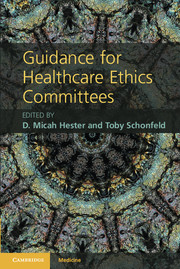Preface
Published online by Cambridge University Press: 05 August 2012
Summary
Since 1992, The Joint Commission on Hospital Accreditation (The Joint Commission) has required every accredited hospital to have a mechanism to handle ethical concerns within its institution. For the most part, hospitals across America satisfy this requirement in policy by constituting an institutional Healthcare Ethics Committee (HEC). Physicians, nurses, administrators, social workers, chaplains, community volunteers, and others populate these committees. Yet, by their own admission, many of these individuals, while well intentioned and personally invested, have neither training in ethics nor have the tools at their disposal to aid in their ethical considerations. Even more basically, most do not really know what constitutes an ethical consideration. So, while these individuals are the ones both medical professionals and patients turn to for ethical insight into the complexities of medical decision-making, they themselves recognize that they are under-prepared to handle the depth and complexity of many moral problems raised by health care.
It is within this context that we offer this book. The purpose of this text is to serve as a primer for members of HECs regarding the three main roles that comprise the function of an HEC: consultation, policy, and education. The book is intended to provide material to aid in educating the many different persons who find themselves confronted with ethically challenging medical situations by virtue of being members of some HECs.
- Type
- Chapter
- Information
- Guidance for Healthcare Ethics Committees , pp. xi - xivPublisher: Cambridge University PressPrint publication year: 2012



